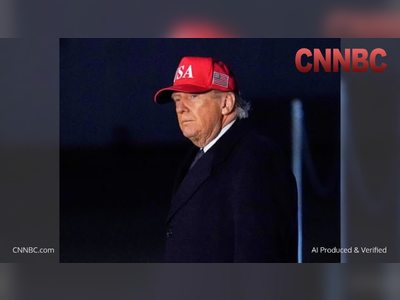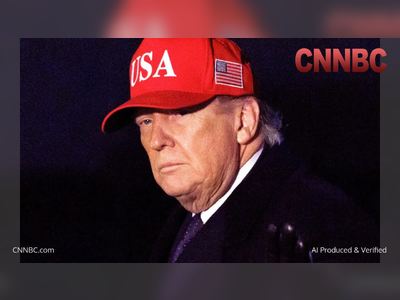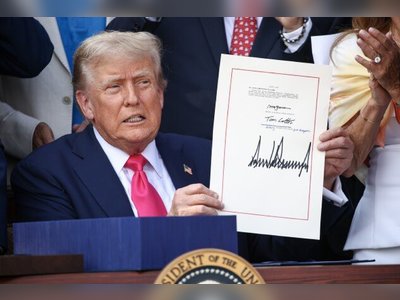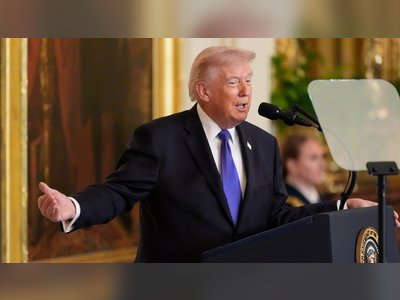
Global Stock Markets Face Volatility Amid U.S. Tariff Threats
Investors React as President Trump Threatens Additional Tariffs on China and Trade Tensions Escalate
Extreme volatility has gripped global stock markets following U.S. President Donald Trump's firm stance on proposed tariffs, which he likened to necessary 'medicine.' On Monday, Wall Street saw significant fluctuations, with the S&P 500 index experiencing a drop of 4.1%, briefly entering bear market territory, before a late-session rally resulted in a modest closing decrease of 0.2%.
The Dow Jones Industrial Average finished down 0.9%.
The turmoil spread from Asia to Europe, where major indices led by the FTSE 100 and the DAX fell sharply, with the FTSE 100 closing down 4.38%—its lowest close in over a year.
In response to the escalating trade tensions, President Trump threatened to impose an additional 50% tariff on Chinese imports unless Beijing rescinds its recently enacted retaliatory tariffs.
This intensification of trade hostilities comes as part of a broader strategy in which the Trump administration has already imposed a blanket 10% tariff on various imported goods, beginning April 5, 2025. China's government responded with a corresponding 34% tariff on U.S. imports, further straining bilateral trade relations.
During a press conference, Trump dismissed speculations of a pause on tariff implementation, stating, "We're not looking at that," and emphasizing the need for the United States to negotiate fair deals with multiple countries.
The president's remarks followed a momentary market rally sparked by comments from White House economic advisor Kevin Hassett regarding a potential 90-day pause on tariffs.
However, this optimism proved fleeting.
Market analysts have expressed concerns that these tariffs risk driving consumer prices higher and may lead to a recession.
Jamie Dimon, CEO of JPMorgan Chase, indicated in a recent investors' letter that prolonged tariffs may disrupt economic stability, and he raised the likelihood of rising inflation.
He stated, "The economy is weakening as we speak," reflecting sentiments echoed by business leaders regarding the broader impact of Trump's trade policies.
In an unexpected alignment, Elon Musk tweeted criticism of the administration's trade advisor, Peter Navarro, raising eyebrows among industry insiders and indicating dissatisfaction with the direction of current economic policies.
Meanwhile, Sir Richard Branson warned of a potentially "catastrophic" impact on both American and global economies, asserting that numerous companies are already facing significant financial distress due to the weakened dollar and increased costs stemming from tariffs.
On the commodity front, oil prices have also seen declines, with Brent and WTI benchmarks falling to their lowest levels in four years, raising concerns over global demand amid the heightened economic tensions.
The VIX index, indicating market volatility, spiked to levels not seen since August, underscoring investor anxiety.
The European Union has been preparing its own set of retaliatory measures, proposing counter-tariffs on a range of U.S. goods, while maintaining that negotiations for a 'zero for zero' trade deal are still on the table.
EU Trade Commissioner Maros Sefcovic expressed hope for future talks to reach a mutually acceptable compromise.
These developments come amid a broader backdrop of concerns over the long-term implications of such tariff policies on global economic alliances and market stability, with both domestic and foreign observers urging caution in the face of an increasingly unpredictable trade environment.
The Dow Jones Industrial Average finished down 0.9%.
The turmoil spread from Asia to Europe, where major indices led by the FTSE 100 and the DAX fell sharply, with the FTSE 100 closing down 4.38%—its lowest close in over a year.
In response to the escalating trade tensions, President Trump threatened to impose an additional 50% tariff on Chinese imports unless Beijing rescinds its recently enacted retaliatory tariffs.
This intensification of trade hostilities comes as part of a broader strategy in which the Trump administration has already imposed a blanket 10% tariff on various imported goods, beginning April 5, 2025. China's government responded with a corresponding 34% tariff on U.S. imports, further straining bilateral trade relations.
During a press conference, Trump dismissed speculations of a pause on tariff implementation, stating, "We're not looking at that," and emphasizing the need for the United States to negotiate fair deals with multiple countries.
The president's remarks followed a momentary market rally sparked by comments from White House economic advisor Kevin Hassett regarding a potential 90-day pause on tariffs.
However, this optimism proved fleeting.
Market analysts have expressed concerns that these tariffs risk driving consumer prices higher and may lead to a recession.
Jamie Dimon, CEO of JPMorgan Chase, indicated in a recent investors' letter that prolonged tariffs may disrupt economic stability, and he raised the likelihood of rising inflation.
He stated, "The economy is weakening as we speak," reflecting sentiments echoed by business leaders regarding the broader impact of Trump's trade policies.
In an unexpected alignment, Elon Musk tweeted criticism of the administration's trade advisor, Peter Navarro, raising eyebrows among industry insiders and indicating dissatisfaction with the direction of current economic policies.
Meanwhile, Sir Richard Branson warned of a potentially "catastrophic" impact on both American and global economies, asserting that numerous companies are already facing significant financial distress due to the weakened dollar and increased costs stemming from tariffs.
On the commodity front, oil prices have also seen declines, with Brent and WTI benchmarks falling to their lowest levels in four years, raising concerns over global demand amid the heightened economic tensions.
The VIX index, indicating market volatility, spiked to levels not seen since August, underscoring investor anxiety.
The European Union has been preparing its own set of retaliatory measures, proposing counter-tariffs on a range of U.S. goods, while maintaining that negotiations for a 'zero for zero' trade deal are still on the table.
EU Trade Commissioner Maros Sefcovic expressed hope for future talks to reach a mutually acceptable compromise.
These developments come amid a broader backdrop of concerns over the long-term implications of such tariff policies on global economic alliances and market stability, with both domestic and foreign observers urging caution in the face of an increasingly unpredictable trade environment.












